Chronicle: Runescape Legends isn't just a Hearthstone knock-off
Never judge a CCG by its card back.
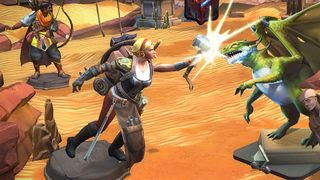
When I first saw Chronicle: Runescape Legends, I'm ashamed to admit I judged it by its cover. I figured Chronicle was just another scavenger on the savanna wanting to greedily gobble up the scraps of players not consumed by Hearthstone. But I was wrong. It's actually a subversive take on card games hidden within pages that, at first glance, look much like a rather shameless rip off of more popular card games. But as I pried open Chronicle's cover, revealing the pop-up storybook aesthetic that inspires its rich journey to undermine what I thought a collectible card game should play like, I began to appreciate what a great treasure Chronicle really is.
Here's the big thing that took me a little while to wrap my head around: Unlike most CCGs, where I use creature cards to attack my opponent, in Chronicle those creature cards attack me—or, well, the statuesque miniature called a Legend that represents me. It's still a player vs player competition, but instead of facing off directly against my opponent, I journey alongside them, encountering cards that will slowly shape my character. I'm my own dungeon master, using the cards I've randomly drawn to tell my hero's epic adventure as they move across iconic locales of Runescape in storybook format.
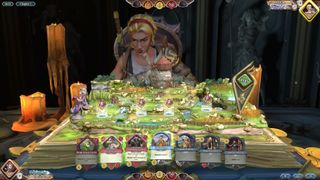
For example, I might face my Legend against a Skeleton Warrior, a creature that will do some damage but will also give me three gold when I defeat it. Using that gold, I could play a "support card" that lets me spend that gold on a weapon. That weapon would help me slay an even deadlier foe who, in turn, will deal damage to my opponent. And for my final turn of the round, I could use the rest of my gold to purchase a potion that would add extra durability to my weapon.
Salvaging a fizzled strategy from the last round will require playing another set of cards that could backfire in equally interesting ways.
Of course, that's what I would like to happen. But after slaying the skeleton, my opponent encounters his first card which lets them steal some of my gold. Before I know it, I have no money to spend on that weapon support card, effectively wasting the card and sending my Legend into a tough fight unarmed. The best laid plans of mice and men, indeed.
That kind of forward thinking is critical to Chronicle, as there's no luxury of reacting to each action my opponent makes during a round. Once each of us have laid our four cards on the table in a specific order, there's nothing we can do until each one has played out. Salvaging a fizzled strategy from the last round will require playing another set of cards that could backfire in equally interesting ways.
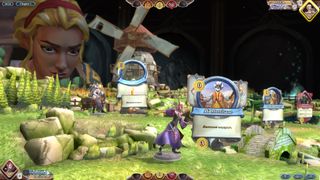
It's here that I sometimes forget I'm even playing what would technically be considered a collectible card game. Chronicle might imitate the basics, like creatures having attack and health stats, or drawing new cards in between each round, but the way I approach problems demands a different kind of logic that I'd rarely use in games like Hearthstone. I'm not just thinking a few moves ahead, I'm also playing and reacting a few moves ahead too—placing cards in a specific order to try to find synergy that will grow my hero.
There's rarely a moment to play it cautious in Chronicle. Each round or "chapter" only lets me play a maximum of four cards, and there's only five chapters in a match. That means I have 20 opportunities to play cards to destroy my opponent, and if I fail, our Legends enter direct combat until one dies. It gives Chronicle this excellent pacing, with rounds rarely only lasting a few minutes, and I love the tension of knowing on the last chapter that it's all or nothing. At first I was worried that Chronicle just wasn't conducive to the kind of climactic finales Hearthstone can create, but setting up your four card play and watching it unfold next to your opponent is actually very thrilling.
PC Gamer Newsletter
Sign up to get the best content of the week, and great gaming deals, as picked by the editors.
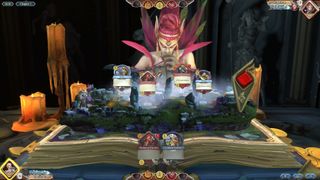
Like Hearthstone, each of the five Legends you can play as has their own flavor and approach to playing. The vampire Vanescula, for example, specializes in sucking the life from her opponents and healing herself. There's also Orzan, the thief, who can use cards to pilfer another players gold and spend it on deadly weapons. My personal favorite remains the blacksmith, Linza, whose entire strategy revolves around getting herself a good weapon and then using cards to buff its stats until it's nearly god-like in power. Going into the final fight with a sword that does 14 damage per turn when my opponent only has 30 life feels intoxicatingly empowering.
Of course, like any collectible card game, there's a ton of cards you can collect either through in-game currency or spending real money. There's also a draft mode for those who love deck building, and a few other bits and bobs that tend to be standard fare for card games these days. But all this scaffolding aside, Chronicle: Runescape Legends remains one of the most original and exciting card game I've played in a long time. Jagex had every opportunity to phone it in with a derivative game and instead made something that subverts expectations and forges into new territory.
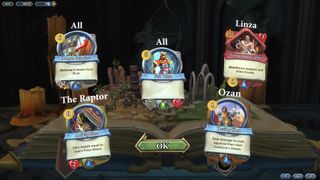
With over 7 years of experience with in-depth feature reporting, Steven's mission is to chronicle the fascinating ways that games intersect our lives. Whether it's colossal in-game wars in an MMO, or long-haul truckers who turn to games to protect them from the loneliness of the open road, Steven tries to unearth PC gaming's greatest untold stories. His love of PC gaming started extremely early. Without money to spend, he spent an entire day watching the progress bar on a 25mb download of the Heroes of Might and Magic 2 demo that he then played for at least a hundred hours. It was a good demo.
Most Popular


